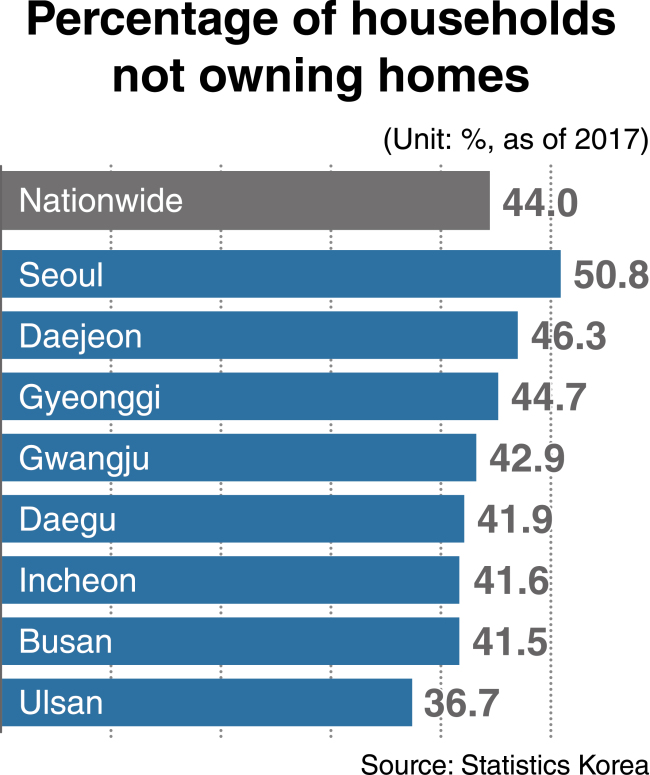SEJONG -- The Moon Jae-in administration has introduced a housing benefit for married couples in an effort to promote marriage and raise the nation’s fertility rate, which is among the lowest in the world.
Those who have been married for less than seven years are favored in apartment subscription, regardless of whether they have children. Public and private-sector constructors are respectively required to provide 30 and 20 percent of newly built apartments to newlyweds.
However, this measure has drawn criticism, with the online community highlighting that 4 in 10 households do not own homes.
According to Statistics Korea, 44 percent, or 8.67 million, of the total 19.67 million households across the nation did not own homes as of the end of 2017. Furthermore, 50.8 percent of 3.81 million households residing in Seoul did not own homes.

(Korea Herald)
Amid intense competition for apartment subscription in Seoul, netizens say the preferential treatment for newlyweds, estimated to be mainly in their 20s and 30s, increases competition among those in their 40s and 50s.
“The government benefit should be primarily offered to houseless people who have multiple children, regardless of age,” a netizen argued. “Are those whose marriage life spans five to six years newlyweds?”
Another online commenter refuted the view, saying, “The houseless in their 40s and 50s are already incapable. What did they do until now? They have had advantages with high scores compared to those in their 30s and 20s in ordinary apartment subscription.”
Meanwhile, newlyweds have complained about the eligibility criteria set by the Land Ministry. As of the second half of 2018, the monthly income of a newlywed household with three family members must not exceed 6.1 million won ($5,450) for it to be given first-tier rights for special apartment supply. In addition, those with income surpassing 6.51 million won are banned from second-tier rights.
“My husband earns about 4 million won a month, and my salary is 3 million won,” said a netizen who identified herself as a Seoul citizen in her early 30s. “We are looking for a house in Gyeonggi Province after giving up applying for an apartment in Seoul.”
Another internet commenter claimed that newlywed couples who have low monthly income but whose parents are wealthy would stand to gain from the housing benefit. “The new apartment supply policy has created a new negative factor undermining social justice.”
He said, “Does the young generation whose household income is under 7 million won really have the ability to pay a 10 or 20 percent deposit on an apartment in Seoul if they pass the subscription competition? Prices of small-sized Seoul apartments range between 600 million and 1 billion won.”

Land Minister Kim Hyun-mee (Government Sejong Complex homepage)
Likewise, many netizens shared the view that the housing benefit for newlyweds essentially helps those whose parents are able to bear a portion of high apartment prices.
A real estate agent in Sejong also highlighted the problem of conflicts between young and middle-aged generations.
He said, “While some households (those in their 40s or older) waited about 10 to 15 years to own an apartment in Seoul, young people can easily purchase it from the beginning of their married life. This is reverse discrimination.”
He added that real estate speculation is increasing among newlyweds despite regulations and a crackdown by the government.
During a groundbreaking ceremony for complexes oriented toward newlyweds in the Wirye new town, southeast of Seoul, Land Minister Kim Hyun-mee said the government will pave the way for newlyweds to stably reside in the long term by keeping a close watch on real estate speculation.
Wirye, consisting of Songpa, Seongnam and Hanam areas, has been designated as a speculation-prone district by the ministry.
By Kim Yon-se (kys@heraldcorp.com)







![[KH Explains] How should Korea adjust its trade defenses against Chinese EVs?](http://res.heraldm.com/phpwas/restmb_idxmake.php?idx=645&simg=/content/image/2024/04/15/20240415050562_0.jpg&u=20240415144419)